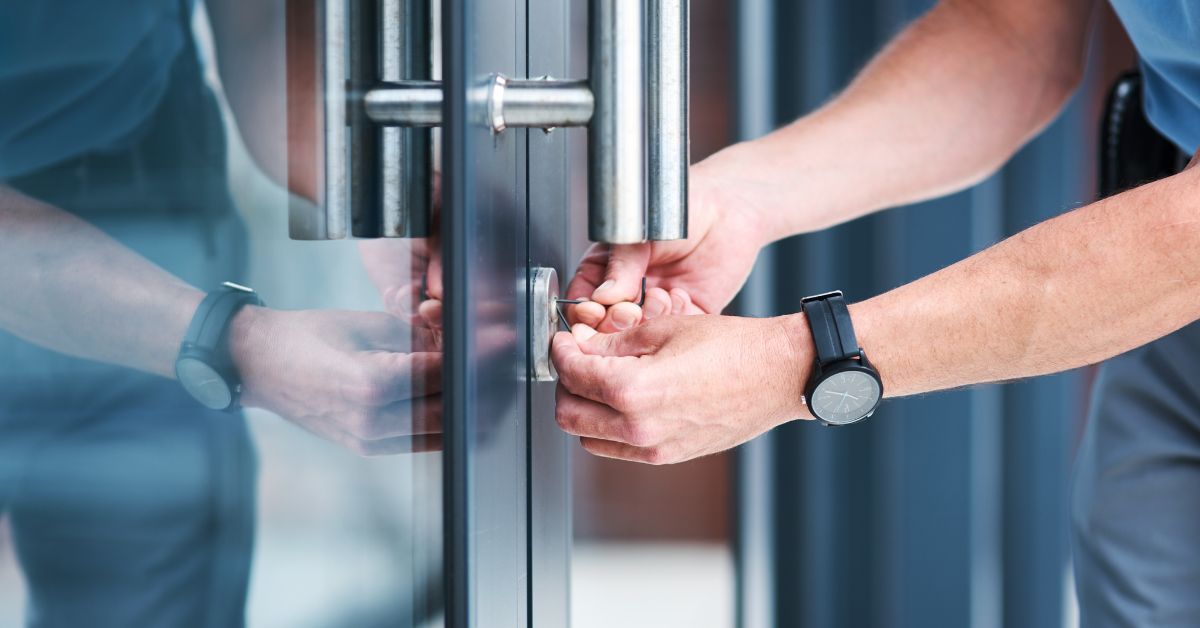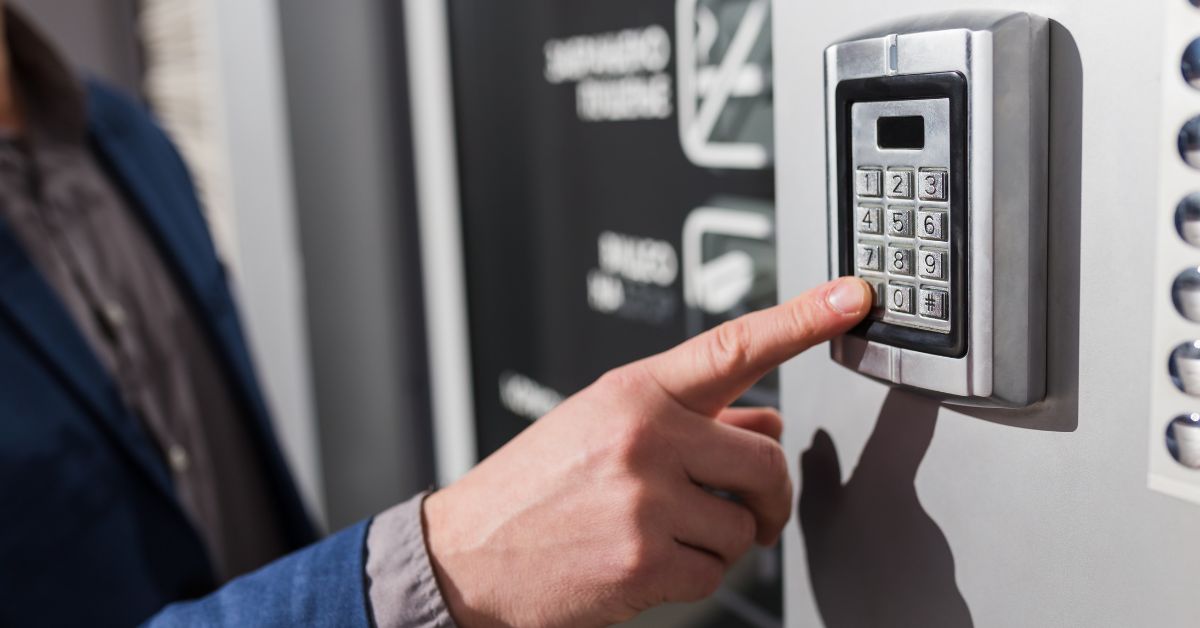Electric vs. Mechanical Door Locks: Which To Choose

Security
Electric door locks come with advanced features like biometric readers, keycards, or PIN systems to improve access control. For example, a grocery store with several staff members may prefer keyless systems that can track who enters and exits. These locks also connect with large security systems like alarms or cameras. However, they remain vulnerable to hacking or power disruptions.
Mechanical locks provide strong resistance against technological failures. These locks don’t rely on electricity, making them dependable during power loss. They do face obstacles such as lock-picking or brute-force attempts. While a sturdy deadbolt can resist tampering, mechanical locks lack integration capabilities, which limits monitoring options.
Cost
Costs differ depending on the type of lock you choose. Electric locks have higher upfront expenses due to advanced technology and system integration. For example, installing a smart lock system with remote monitoring is expensive, but it can reduce staffing costs when managing multiple access points. Long-term operational investments include electricity usage and software updates.
Mechanical locks, on the other hand, stick to a lower budget for installation. A basic key-and-lock setup works well for small establishments and requires minimal repairs. However, frequent key replacement or emergency locksmith visits could escalate costs over time.
Businesses with expansive budgets might choose electric locks for scalable systems, while those seeking affordability may choose mechanical locks.

Installation
Professionals will take care of electric lock installation, especially when the locks integrate into large security systems. A tech-focused building needs technicians to rewire older structures and update door hardware. They align every component—such as access control panels and alarms—with the existing system to ensure compatibility. This detailed coordination improves functionality but takes more time and demands precise planning.
Mechanical locks, however, make installation faster and less complex. Locksmiths complete these setups quickly, especially when existing hardware requires minimal adjustments. Retrofitting older doors is simple since mechanical locks match existing components. This speed helps businesses with tight schedules or limited budgets to upgrade their security.
Ultimately, each lock fits different demands. Buildings that prioritize high-tech systems benefit from electric locks, despite the longer setup process. Meanwhile, businesses that need a straightforward solution prefer the cost-effective, hassle-free installation of mechanical locks.
Maintenance
Electric locks deliver advanced functionality, but their upkeep demands consistent attention. Many models include internal components such as batteries, circuit boards, and motors that need periodic servicing.
For instance, a business with a high-traffic office with multiple entry points must schedule regular maintenance checks to ensure the software remains up-to-date and the hardware operates reliably. Failing to update software might leave the system vulnerable to breaches. Another factor involves battery life. Some models require frequent replacements, especially in locks without a hardwired power source.
Additionally, the durability of electric locks depends on their environment and use. High-quality models can function for years without major issues. However, exposure to extreme temperatures or heavy usage could shorten their lifespan. For example, a door in a warehouse that endures constant opening and closing may put extra strain on the system, causing it to break down more quickly.
Mechanical door locks excel in terms of simplicity and lower maintenance. With only a few moving parts, their upkeep involves checking wear and tear. Additionally, occasional dusting and lubricating prevent stiffness and enhance function.
Rust and corrosion are common issues, especially in humid environments. However, weatherproof coatings or stainless-steel materials reduce this risk. Regarding longevity, high-quality mechanical locks can last decades even under consistent use. A locksmith can repair mechanisms or replace components without requiring full lock replacement. However, despite their durability, extreme weather or forced entry attempts may eventually degrade the lock.
User Convenience
Electric locks are convenient through their keyless designs. Business owners enjoy greater control over access through PIN codes, key cards, or smartphone apps. These features allow employees and visitors to enter without carrying physical keys, speeding up daily operations. Remote access offers additional flexibility as it allows property managers to grant temporary access to visitors.
Despite their conveniences, electric locks can sometimes complicate access when the technology malfunctions. An office might face delays if an Internet-dependent locking system goes offline. Power surges or tampering could also hinder electric systems.
Mechanical locks can also be convenient because they don’t require tech expertise. Turning a key is simple. These locks eliminate digital dependencies, allowing users to access buildings consistently.
They do come with limitations. Losing or forgetting keys creates inconveniences, especially for busier commercial spaces. Businesses with high staff turnover might find distributing and retrieving physical keys an ongoing issue. Therefore, mechanical locks suit environments with a low risk of lost keys.
Which Style of Door Will Benefit Your Business?
When choosing electric and mechanical door locks, it’s best to assess their commercial applications. After all, you want a lock that complements your security system. Let’s evaluate the best use for each lock.
Best Uses for Electric Door Locks
Electric door locks fit businesses requiring advanced security features and operational flexibility. Commercial spaces managing multiple entry points—such as corporate offices, retail chains, and large warehouses—need these systems.
Electric locks streamline access with digital solutions and their centralized control enables precise monitoring. These locks also serve environments with high turnover rates or frequent access adjustments. For example, a company with contract employees or rotating shifts can easily update or revoke permissions without rekeying locks.
Best Uses for Mechanical Door Locks
Mechanical locks support small enterprises or businesses with straightforward security requirements. Businesses like cafés, small retail shops, or local offices prefer the reliability and simplicity these locks provide. Their durable construction ensures dependable performance in low-traffic environments.
Mechanical locks work well in areas with relatively stable security needs. Businesses without frequent personnel changes benefit from a lock system that rarely calls for adjustments. The ability to access the facility during technological failures—such as power outages and software glitches—adds another layer of practicality.
Can You Have Both Types of Doors?
Yes, businesses can use electric and mechanical door locks to create a layered security system. Combining these two types allows property owners to address a wide range of security needs within the same space. For example, electric locks work to support exterior doors, while mechanical locks suit interior doors, like office supply closets or storage rooms.

Buy Door Locks Today!
Are you searching for door locks for sale? Look no further than DoorHub. We have an extensive lock selection to suit different commercial buildings. Don’t wait to upgrade your security when you can take care of this task immediately. Browse our door locks today!

Author
Michael Rega
Chief Marketing Officer and founding Member of DoorHub.com